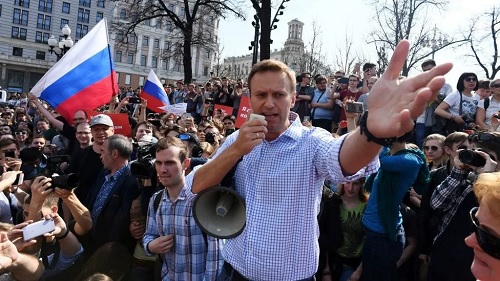
Putin critic Alexei Navalny, 47, dies in Arctic Circle jail
Russia's most significant opposition leader for the past decade, Alexei Navalny, has died in an Arctic Circle jail, the prison service said.
Seen as President Vladimir Putin's most vociferous critic, Navalny was serving a 19-year jail term on charges widely considered politically motivated.
He was moved to one of Russia's toughest penal colonies late last year.
The prison service in the Yamalo-Nenets district said Navalny had "felt unwell" after a walk on Friday.
He had "almost immediately lost consciousness", it said in a statement, adding that an emergency medical team had immediately been called and tried to resuscitate him but without success.
"The emergency doctors declared the prisoner dead. Cause of death is being established."
Navalny, 47, was last seen only a day ago, looking well and laughing during a court hearing via video link.
His lawyer Leonid Solovyov told Russian media he would not be commenting yet, although Navalny's close aide Leonid Volkov wrote on X:
"Russian authorities publish a confession that they killed Alexei Navalny in prison. We do not have any way to confirm it or to prove this isn't true."
Within minutes of Navalny's death being announced by the prison service, the international community hailed the courage of Vladimir Putin's biggest domestic adversary.
![]()
Alexei Navalny
France said he had paid with his life for resisting Russian "oppression", while Norway's foreign minister said Russian authorities bore a great responsibility for his death.
Mr Putin's spokesman, Dmitry Peskov, said merely that Navalny's death had been "reported to the president", who was on a visit to the city of Chelyabinsk.
Most of the Russian president's critics have fled Russia, but Alexei Navalny returned in January 2021, after months of medical treatment. In August 2020 he was poisoned at the end of a trip to Siberia with a Novichok nerve agent.
His team succeeded in flying him out to Germany for specialist treatment and on his return to Moscow he was immediately taken into custody.
He would never leave jail again in the next 37 months.
Navalny, who was 47, had long sought to challenge Vladimir Putin at the ballot box, but he was barred from running in the 2018 presidential election. Next month, Russia's leader will stand unchallenged by any meaningful opposition.
Anti-war candidate Boris Nadezhdin was banned from standing in the election because of supposed irregularities found in the thousands of signatures submitted in support of his candidacy.
Navalny, whose opposition began in the form of an anti-corruption campaign, is the latest in a string of prominent Russian figures who have died while challenging Vladimir Putin's rule.
Opposition leader Boris Nemtsov was shot dead on a Moscow bridge a stone's throw from the Kremlin in 2015, and Wagner boss Yevgeny
Prigozhin was killed in August 2023 in an unexplained plane crash weeks after leading his mercenaries in an armed mutiny.
Yet Navalny repeatedly laughed off his friends' concerns for his health. He was moved from a penal colony east of Moscow in December and was not seen for weeks until he reappeared in a penal colony in the Arctic town of Kharp.
Navalny said he had been taken on a 20-day trip around Russia, telling reporters during a court appearance by video that his conditions were "much better" than in his previous penal colony in Vladimir.
However, he was repeatedly punished by his prisons with solitary confinement.
His spokeswoman Kira Yarmysh said last month he had spent more than 280 days in isolation.
Navalny had not been due to leave prison until his 70s, because of his most recent conviction for extremism last August.
It was his third jail sentence and supporters accused the Kremlin of trying to silence him for good.
Russian human rights activist and journalist Eva Merkacheva said on Friday that he had been placed in solitary confinement at least 27 times, saying it "could not but play a role" in his death.
In such extreme conditions doctors knew that such punishment was very harmful to the human body, so under the law no-one could be given more than 15 days in isolation, she said.
